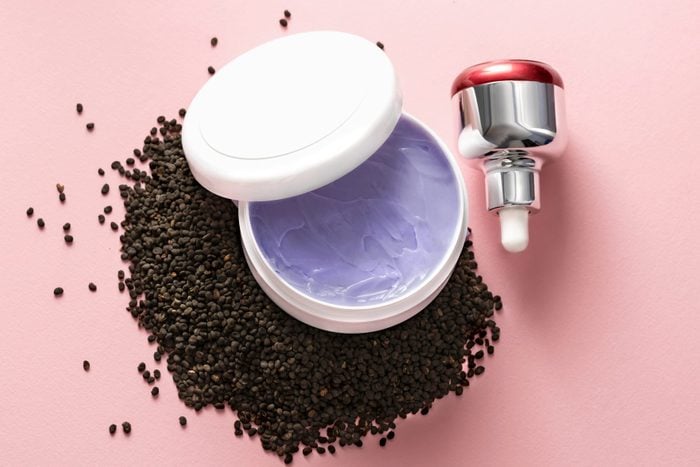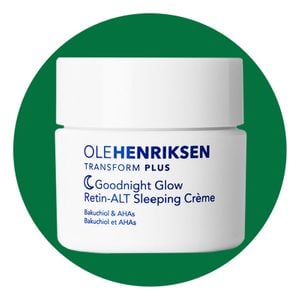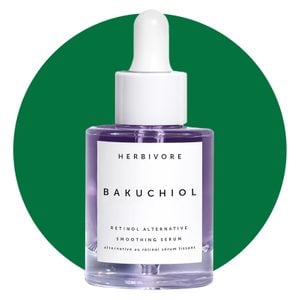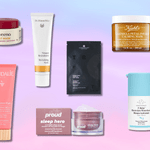Bakuchiol: Why You Should Try This Retinol Alternative

If you are looking for a gentler option to get rid of wrinkles, bakuchiol could be the answer. Find out how it works—plus, top bakuchiol products dermatologists love.
Retinol is a holy grail skin care ingredient, tackling everything from fine lines and wrinkles to acne and dark spots. Many dermatologists consider it a must-have in anybody’s skin care arsenal. But it’s is also famously irritating and can lead to issues like redness, dryness, peeling, and sensitivity. That can leave you in a pickle if you’re looking for proven anti-aging benefits but can’t tolerate the side effects of retinol. That’s where bakuchiol comes in.
The plant extract is often touted as a retinol alternative. In fact, many prefer it to retinol because of its less-irritating properties. “Bakuchiol would be a nice choice if you want some of the effects of retinol—smoothing fine lines and wrinkles, evening pigment, and improving firmness—without the irritation that comes with a retinol,” explains Scott Paviol, MD, dermatologist of Paviol Dermatology in Charlotte, North Carolina. “It may not have quite the top-end potency of retinoic acid, but you’re still going to see results and have fewer side effects,” he says. “It also does not increase sun sensitivity as retinol does.”
In fact, while bakuchiol is frequently mentioned in the same breath as retinol, it’s effective enough to deserve the spotlight on its own. “Bakuchiol promotes cellular turnover and skin repair,” says Peterson Pierre, MD, a cosmetic and medical dermatologist in Thousand Oaks, California. “It stimulates collagen production, thereby improving tone, texture, fine lines, and wrinkles. It fights free radical damage, decreases inflammation, and has antimicrobial properties.” Here’s everything you need to know about bakuchiol, how it compares to retinol, and some product recommendations to try.
(Related: Niacinamide and Your Skin: Benefits—Plus Expert Tips on Using It)
What is bakuchiol?
Like many buzzy skin care ingredients, bakuchiol is found in nature and comes from plants. “Bakuchiol is an antioxidant extract from the seeds of the plant Psoralea corylifolia that has reportedly been used in traditional Chinese and Indian medicine for a variety of conditions,” says Dr. Paviol. Bakuchiol isn’t a vitamin A derivative like retinol is, and it has a different chemical structure. Yet it works on the same receptors as retinol, with similar effects on the skin. “Therefore, you’re getting the anti-aging effects of a retinol without the irritation caused by the retinol,” says Dr. Paviol.
He points to a 2018 study in the British Journal of Dermatology, which highlights bakuchiol’s ability to smooth fine lines and wrinkles, even pigmentation, stimulate collagen, and firm the skin. “In addition, it doesn’t cause redness, dryness, or skin irritation like your traditional retinol [products],” says Dr. Paviol.
One of the advantages of bakuchiol is that, unlike retinol, it can be used during the day. It also has some antioxidant properties, which means it’s a natural fit underneath your daily SPF.
(Related: The Best Mineral Sunscreen to Reflect the Sun’s Harsh Rays)
Bakuchiol serum vs. cream
Bakuchiol is available in various forms, including serum and cream versions. When studies have tested the effectiveness of bakuchiol, notes Dr. Paviol, they’ve compared the cream version of the ingredient to the cream form of retinol. Creams with bakuchiol are increasingly common, but are they more effective than bakuchiol serum? Ultimately, the form doesn’t matter, says Dr. Pierre. Both creams and serums work well. Look for a type of bakuchiol that suits your skin. “The base really depends on your skin type,” he says. “Choose a serum if you tend to be oily but a cream if you’re more on the dry side.”
Avoiding irritation with bakuchiol
Bakuchiol is a powerful ingredient for stimulating cell turnover and reducing pigmentation, says dermatologist Anna Guanche, MD, a dermatologic surgeon and founder of Bella Skin Institute in Calabasas, California. But while it’s less irritating than retinoids, its potency means it might not be a match made in heaven with retinol itself. “For this reason, if used with a retinol, there may be more irritation and peeling,” explains Dr. Guanche.
Beyond retinol, experts really aren’t sure how bakuchiol might react with other skin care ingredients. “More studies are necessary at this point to see which skin care actives it may interact with,” she says. “There are compounds of this ingredient with AHAs [alpha-hydroxy acids] and BHAs [beta-hydroxy acids], so we could deduce from that that glycolic and salicylic acid are okay to combine with bakuchiol.” Keep an eye on your skin’s reactions. If certain ingredients cause irritation in combination with bakuchiol, don’t use the two at the same time.
Boosting bakuchiol’s effectiveness
Maximizing your skin care routine means understanding that some ingredients, when used in unison, may counteract one another. Others can make each other more effective. You may get more bang for your bakuchiol buck by combining it with certain ingredients that help it do its job even better. “Ingredients that allow penetration, such as mild acids like AHAs and BHAs could improve penetration through the stratum corneum,” says Dr. Guanche. Translation: using bakuchiol with glycolic or salicylic acid could help it get through the outer layer of the skin, which will make it more effective.
(Related: How to Give Yourself a Spa-Worthy At-Home Facial)
Risks or side effects
Dr. Guanche says you don’t need to build up a tolerance to bakuchiol as you do with retinol. You can dive in right away. “In general, bakuchiol is relatively gentle and can be used daily,” she says. “There is not a reported adjustment period.” In fact, you can even use it up to two times per day. And as far as side effects go, no current studies show unwanted side effects from bakuchiol’s use, says Dr. Paviol.
Ranella Hirsch, MD, dermatologist and co-founder of skin care brand Atolla, notes that because bakuchiol is a plant, it’s possible some people might experience allergic reactions. And because there aren’t a ton of studies on bakuchiol, it’s hard to gauge how everybody (or an unlucky few) might react. One group that may want to steer clear: new or expectant mothers. “To be on the safe side, because bakuchiol is relatively new to scientific studies, I would avoid using it if pregnant or breastfeeding until more studies come out,” Dr. Paviol says.
Bakuchiol products
To get you started on finding the best bakuchiol products, we asked our dermatologists for their recommendations to add to any skin care routine.

Ole Henriksen Goodnight Glow Retin-Alt Sleeping Crème
$71, sephora.com
Dr. Paviol recommends this rich night cream, which also includes AHAs to get more glow and smoother skin while you sleep. Alpha hydroxy acid is derived from a variety of natural ingredients, such as citric acid from oranges and lemons, to make your skin look brighter.

Herbivore Bakuchiol Retinol Alternative Smoothing Serum
$71, thedetoxmarket.ca
This popular serum is light, cruelty-free, and dries quickly. Dryness, uneven texture, fine lines, and wrinkles are among the skin concerns this product helps address. It features tremella mushroom, designed to help skin retain moisture. Another noteworthy ingredient—in addition to bakuchiol—is polyhydroxy acid (PHA), which works to gently exfoliate the skin and boost absorption to keep skin feeling silky smooth.




